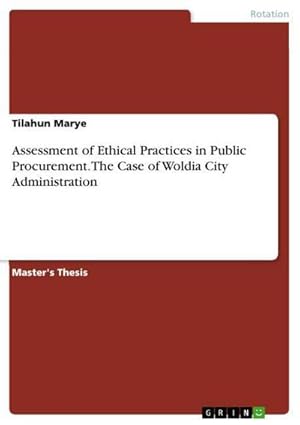Tilahun Marye (2 results)
Product Type
- All Product Types
- Books (2)
- Magazines & Periodicals
- Comics
- Sheet Music
- Art, Prints & Posters
- Photographs
- Maps
-
Manuscripts &
Paper Collectibles
Condition
- All Conditions
- New
- Used
Binding
- All Bindings
- Hardcover
- Softcover
Collectible Attributes
- First Edition
- Signed
- Dust Jacket
- Seller-Supplied Images
- Not Printed On Demand (1)
Seller Location
Seller Rating
-
Assessment of Ethical Practices in Public Procurement. The Case of Woldia City Administration
Published by GRIN Verlag Dez 2015, 2015
ISBN 10: 3668097348ISBN 13: 9783668097346
Seller: BuchWeltWeit Ludwig Meier e.K., Bergisch Gladbach, Germany
Book Print on Demand
Taschenbuch. Condition: Neu. This item is printed on demand - it takes 3-4 days longer - Neuware -Master's Thesis from the year 2015 in the subject Organisation and Administration, grade: B, , course: Masters Thesis - Public Procurement and Asset Management, language: English, abstract: This study was carried out for the purpose of determining the status of public procurement officers' ethical practices based on public procurement roles in achieving government objectives. The descripto-explanatory design of research was utilized. The questionnaire, observation, semi-structured interview and focus group discussion served as the instrument for gathering data. All public procurement officers that worked in the pool sector offices and suppliers who frequently deliver products and services that are found in Woldia city were employed for the study.The study aims to answer the questions raised in the basic ethical practices of public procurement. Based on the data obtained from 16 procurement officers, the result indicated that only procurement used as an economic policy, by giving preference for small and micro enterprises. In contrary 75%'s of procurement officers did not purchased environmentally friendly products and services. Based on findings from questionnaires and interview of procurement as a social policy tool, only 46% and 6% of procurement officers were gave preference for women suppliers and disable suppliers respectively. The findings from observation and focus group discussion revealed that lack of knowledge and the preference in not included in the procurement proclamation and manual was the major reason for not to give preference for these suppliers. The study also revealed that suppliers have negative attitudes towards procurement officers; 58% of suppliers were dissatisfied with procurement officer's equal treatment, the same evaluation criteria and confidentiality of public procurement officers practices. Again 53% of suppliers disagreed that procurement officers were not prepare bids unbiased. While 52% of supplier revealed that procurement officers was not collude with suppliers.The findings acknowledge that procurement officers' lack of knowledge and the Amhara National Regional State public procurement proclamation and manual do not incorporate environmental and social criteria and this hinders from achieving procurement objectives. [.] 100 pp. Englisch.
-
Assessment of Ethical Practices in Public Procurement. The Case of Woldia City Administration
Published by GRIN Verlag, 2015
ISBN 10: 3668097348ISBN 13: 9783668097346
Seller: AHA-BUCH GmbH, Einbeck, Germany
Book
Taschenbuch. Condition: Neu. Druck auf Anfrage Neuware - Printed after ordering - Master's Thesis from the year 2015 in the subject Organisation and Administration, grade: B, , course: Masters Thesis - Public Procurement and Asset Management, language: English, abstract: This study was carried out for the purpose of determining the status of public procurement officers' ethical practices based on public procurement roles in achieving government objectives. The descripto-explanatory design of research was utilized. The questionnaire, observation, semi-structured interview and focus group discussion served as the instrument for gathering data. All public procurement officers that worked in the pool sector offices and suppliers who frequently deliver products and services that are found in Woldia city were employed for the study.The study aims to answer the questions raised in the basic ethical practices of public procurement. Based on the data obtained from 16 procurement officers, the result indicated that only procurement used as an economic policy, by giving preference for small and micro enterprises. In contrary 75%'s of procurement officers did not purchased environmentally friendly products and services. Based on findings from questionnaires and interview of procurement as a social policy tool, only 46% and 6% of procurement officers were gave preference for women suppliers and disable suppliers respectively. The findings from observation and focus group discussion revealed that lack of knowledge and the preference in not included in the procurement proclamation and manual was the major reason for not to give preference for these suppliers. The study also revealed that suppliers have negative attitudes towards procurement officers; 58% of suppliers were dissatisfied with procurement officer's equal treatment, the same evaluation criteria and confidentiality of public procurement officers practices. Again 53% of suppliers disagreed that procurement officers were not prepare bids unbiased. While 52% of supplier revealed that procurement officers was not collude with suppliers.The findings acknowledge that procurement officers' lack of knowledge and the Amhara National Regional State public procurement proclamation and manual do not incorporate environmental and social criteria and this hinders from achieving procurement objectives. [.].



